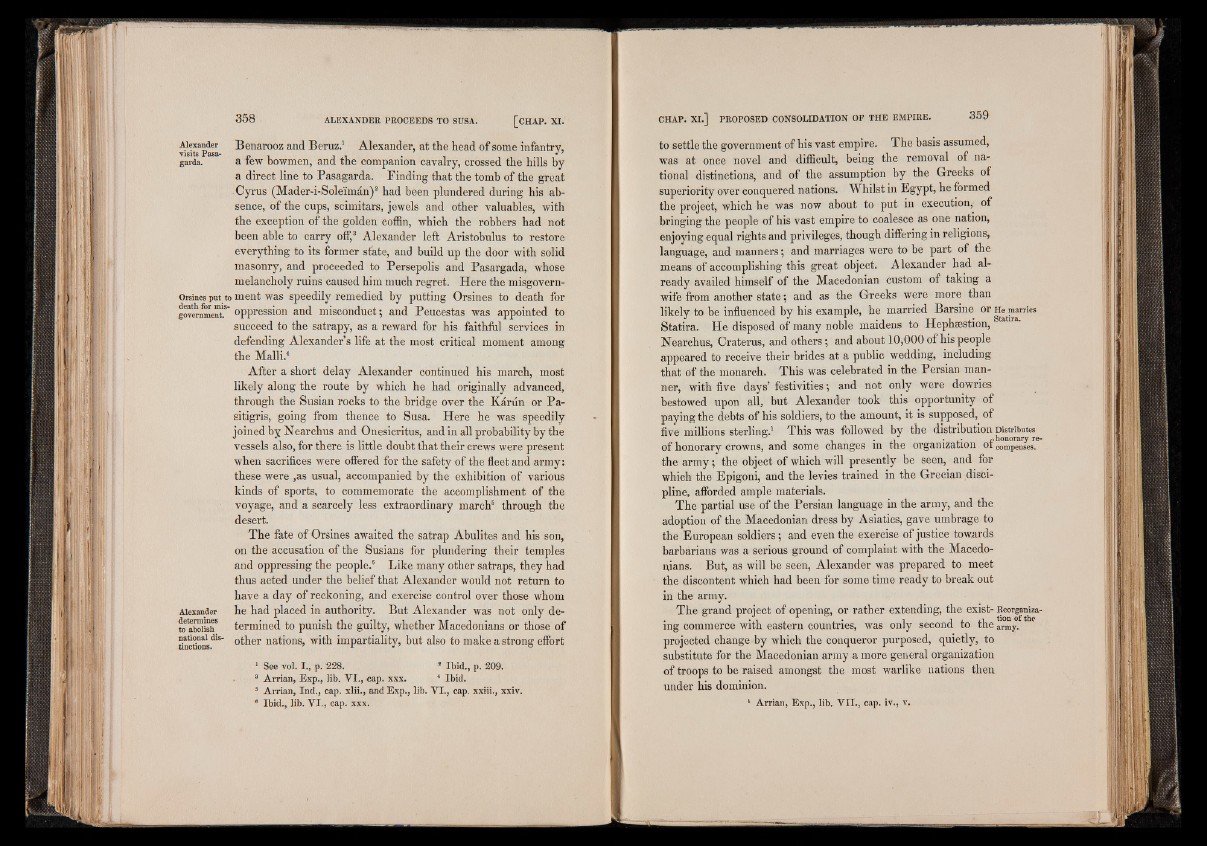
Alexander Benarooz and Beruz.1 Alexander, at the head of some infantrv, visits Pasa- *
garda. a few howmen, and the companion cavalry, crossed the hills by
a direct line to Pasagarda. Finding that the tomb of the great
Cyrus (Mader-i-Soleiman)2 had been plundered during his absence,
of the cups, scimitars, jewels and other valuables, with
the exception of the golden eoffin, which the robbers had not
been able to carry off,3 Alexander left Aristobulus to restore
everything to its former state, and build up the door with solid
masonry, and proceeded to Persepolis and Pasargada, whose
melancholy ruins caused him much regret. Here the misgovern-
Orsines put to ment was speedily remedied by putting Orsines to death for
government.8' oppression and misconduct; and Peucestas was appointed to
succeed to the satrapy, as a reward for his faithful services in
defending Alexander’s life at the most critical moment among
the Malli.4
After a short delay Alexander continued his march, most
likely along the route by which he had originally advanced,
through the Susian rocks to the bridge over the Karun or Pa-
sitigris, going from thence to Susa. Here he was speedily
joined by Nearchus and Onesicritus, and in all probability by the
vessels also, for there is little doubt that their crews were present
when sacrifices were offered for the safety of the fleet and army:
these were ,as usual, accompanied by the exhibition of various
kinds of sports, to commemorate the accomplishment of the
voyage, and a scarcely less extraordinary march6 through the
desert.
The fate of Orsines awaited the satrap Abulites and his son,
on the accusation of the Susians for plundering their temples
and oppressing the people.6 Like many other satraps, they had
thus acted under the belief that Alexander would not return to
have a day of reckoning, and exercise control over those whom
Alexander he had placed in authority. But Alexander was not only deto^
bSi8 termined to punish the guilty, whether Macedonians or those of
Unctions^ ° ^ er nations, with impartiality, but also to make a strong effort
1 See vol. I., p. 228. ! Ibid., p. 209.
3 Arrian, Exp., lib. V I., cap. xxx. 4 Ibid.
5 Arrian, Ind., cap. xlii., and Exp., lib. V I., cap. xxiii., xxiv.
to settle the government of his vast empire. The basis assumed,
was at once novel and difficult, being the removal of national
distinctions, and of the assumption by the Greeks of
superiority over conquered nations. Whilst in Egypt, he formed
the project, which he was now about to put in execution, of
bringing the people of his vast empire to coalesce as one nation,
enjoying equal rights and privileges, though differing in religions,
language, and manners; and marriages were to be part of the
means of accomplishing this great object. Alexander had already
availed himself of the Macedonian custom of taking a
wife from another state; and as the Greeks were more than
likely to be influenced by his example, he married Barsine or He^names
Statira. He disposed of many noble maidens to Hephsestion,
Nearchus, Craterus, and others; a n d a b o u t 10,000 of his people
appeared to receive their brides at a public wedding, including
that of the monarch. This was celebrated in the Persian manner,
with five days’ festivities; and not only were dowries
bestowed upon all, but Alexander took this opportunity of
paying the debts of his soldiers, to the amount, it is supposed, of
five millions sterling.1 This was followed by the distribution Distributes
, . , . . . n honorary re- of honorary crowns, and some changes in the organization ot compenses.
the army; the object of which will presently be seen, and for
which the Epigoni, and the levies trained in the Grecian discipline,
afforded ample materials.
The partial use of the Persian language in the army, and the
adoption of the Macedonian dress by Asiatics, gave umbrage to
the European soldiers; and even the exercise of justice towards
barbarians was a serious ground of complaint with the Macedonians.
But, as will be seen, Alexander was prepared to meet
the discontent which had been for some time ready to break out
in the army.
The grand project of opening, or rather extending, the exist- Reorganiza-
ing commerce with eastern countries, was only second to the army,
projected change by which the conqueror purposed, quietly, to
substitute for the Macedonian army a more general organization
of troops to be raised amongst the most warlike nations then
under his dominion.
1 Arrian, Exp., lib. V II., cap. iv., v.